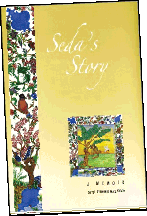 |
Edited by Bonnie MacLachlan
Sumach Press
135 pages. $18.95 paperback.
Recognizing Seda’s “gift for writing,” Professor Bonnie MacLachlan mentored her sensitive Persian-Canadian student at the University of Western Ontario. Seda confided the reasons behind her emotional scars and absences from class. Visiting Seda in the hospital after her suicide attempts, MacLachlan offered support as Seda shared her powerful writings, which appear in this book.
Born in 1975 in Iran as the second daughter of a man who wanted a son, Seda could never win her father’s love. He abused her even after her little brother Toofan was born. By Iranian law, children belong to their father at age 7; Seda’s mother, Saboor, was powerless to stop the abuse. When Seda’s body matured at age 9, her father added sexual abuse to his torments, also molesting her older sister, Moje. He swore he would cut their mother’s throat if the girls told anyone. Only when he was away on military duty could the children relax with their beloved mother.
Later, in letters to Sharzhad (whom we know as Scheherezade, spinner of tales that saved her life for 1,001 Arabian nights), Seda preserved herself by recounting, in graphic detail, her father’s savage attacks. Eight of these letters – relentless stream-of-consciousness accounts – open Seda’s Story. From the first letter: “I really hate myself. I hate every inch of my body. Everywhere he touches me becomes ugly and smelly.” From the last: “Today is my birthday. It is the worst day of my life. It’s been 10 long years and I am ready to die.”
Excruciating to read, these raw testimonies allow those who care about or counsel people haunted by similar memories to comprehend such intimate violations. (MacLachlan notes that “these narratives could be deeply disturbing to a reader in a vulnerable state.”)
Placing Seda’s writings in context, MacLachlan’s preface sketches the events of Seda’s life. Her family moved to Canada when Seda was 13. A year later, when Seda went to school visibly bruised, school officials called the police, resulting in the removal of all three children to a foster home. In this new, safe environment, 14-year-old Seda found the courage to file charges of sexual abuse against her father. Although she lost the case because she had no medical records for proof, her parents finally separated. The children were reunited with their mother after a year in foster care, their bond as strong as ever. Determined to move forward, Seda finished high school and graduated from college with an honors degree in English.
Seda’s writings as a young woman chronicle her struggles to heal. Organized here by topic, her poetry reveals enormous resilience, alternately crippled by doubt and bolstered by hope. Self-abuse brought relief: “Maybe if I cut and cut, /I can cut out my father’s part. … Let me carve the child out. … Maybe the woman will rise.”
Right before Seda began a graduate program in social work, a car accident proved to be the last straw. In 2004, exhausted and in chronic pain at age 29, Seda sealed a pact with her mother. Saboor made two promises: She gave Seda “permission to leave this life” (she killed herself) and pledged that Seda’s writing would be published, to help others.
At Saboor’s request, MacLachlan compiled and edited Seda’s work in this volume, which is made up of three sections: “Letters to Sharzhad,” “Seda’s Journey” (the poems) and a fictional “Persian Tale” of a woman under the threat of male violence. A bibliography lists resources for survivors of sexual abuse and their families and supporters. For all of them, Seda’s Story has immense value, also helping physicians and therapists to reach those who suffer such abuse. (416) 929-2774, http://www.sumachpress.com.































